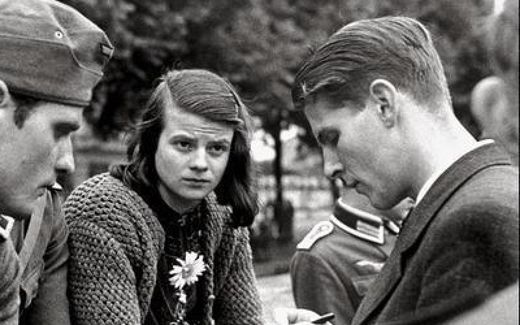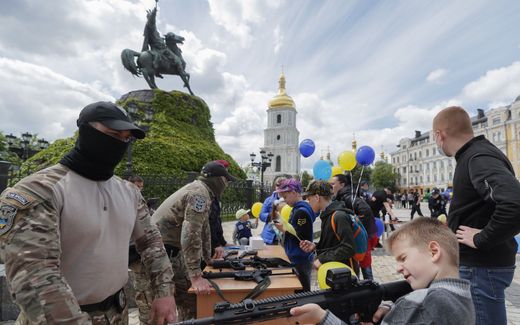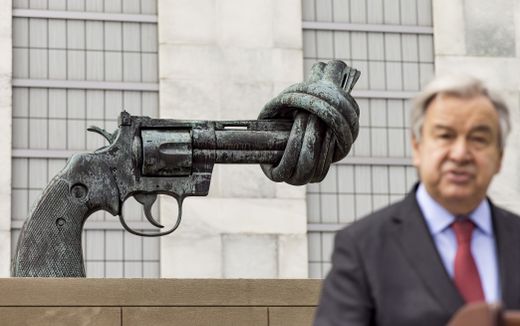What would Bonhoeffer do? Praying and fasting for peace
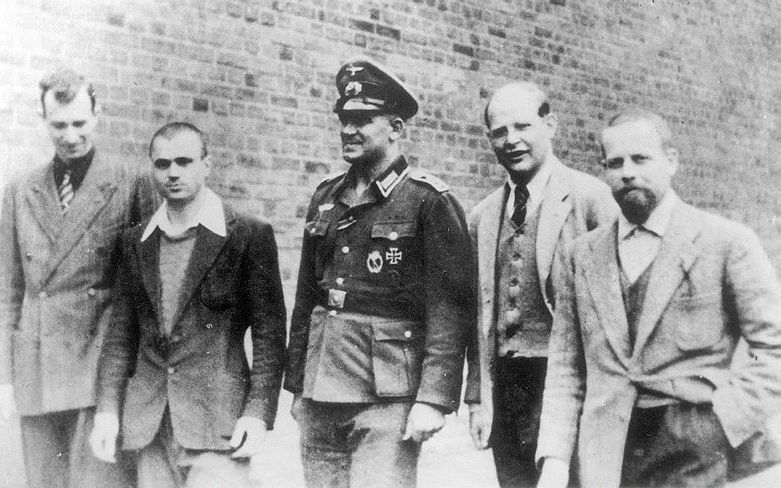
Dietrich Bonhoeffer (2nd from the right) shortly after his arrest in the prison Berlin-Tegel. Photo EPD-Bild
Christian Life
For many Christians, serving under arms is an honour. You defend your country and people, and that is a good thing. But the German theologian Dietrich Bonhoeffer questioned this. As soon as you kill other Christians, the armoury brings dishonour.
If it had been up to Bonhoeffer, the German church would have said to the young people: Refuse military service. And if you do put on the uniform, at least refuse to shoot.
Eighty years later, Prof. Rainer Mayer can still have a laugh about it in his home in Stuttgart. “If all Christians had refused, Hitler would not have been able to wage war.”
Yet the German professor emeritus of the University of Mannheim shakes his head. Nor was that Bonhoeffer’s intention. “For him, peace was a bold step of faith, not a program. He did not want to confuse peace with security. Prayer and fasting was the answer. You can only understand that spiritually. That is why it is often dismissed as a young man’s fantasy.
Prof. Mayer (1941) has long been concerned with Bonhoeffer (1906-1945). In the 1960s, he received his doctorate in theology with a study of Bonhoeffer.

He knows his way in the collected works. The pile to the left and right of Mayer’s chair keeps growing during our conversation. Just checking this, just adding that article.
Bonhoeffer’s vision of war and peace appeals to Mayer. More than once, he wrote articles under the heading: “The Bible knows no just war”, for instance, just before the Iraq war in 2003. For this, he refers to Bonhoeffer's speech at an international Christian gathering in Fanø, Denmark, in 1934.
Bonhoeffer at the peace conference
Dietrich Bonhoeffer had a very international outlook for his time. He stayed in the United States for long periods on several occasions.
It is, therefore, no surprise that Bonhoeffer spoke at the Ecumenical Council on the Danish Wadden Island of Fanø in 1934.
His speech “Church and World of Nations” is included in his collected works in both German and English. These two texts are not identical.
In his speech, Bonhoeffer emphatically states that peace is a “commandment of God”. He compares this with the voice of the snake in paradise. Ultimately, blessing can only be expected by following God’s commandment.
This speech can be found in the German "Dietrich Bonhoeffer Werke" (DBW), volume 13, pages 298-305.
That was more than a year after Hitler’s rise to power. Mayer: “For Bonhoeffer, it was already clear then that it would be war.”
In Fanø, Bonhoeffer gave the impression that he was a pacifist.
“Yet he is not. He calls himself a Christian pacifist. The humanist pacifist speaks of peace as soon as the parties renounce war. But a Christian seeks the welfare of all people, shalom. The humanist objection to nuclear weapons is that they may one day be used. But a Christian regrets that nations threaten each other. Moreover, humanists talk about creating peace as if that is in our power. Bonhoeffer points especially to prayer.”
Do work and prayer form a contradiction?
“Good question. Prayer can have an effect on an organisation. But Bonhoeffer did not want to organise peace. He hoped for a church that, under the cross, proclaimed peace in a raging world.
In doing so, he was deeply convinced that following God’s commandment involves suffering. That became more and more real. Indeed, after 1940, refusal to do military service would have been punished with a bullet, so he never forced his students to do so. The humanist does not talk about suffering; on the contrary, he wants to banish that.”
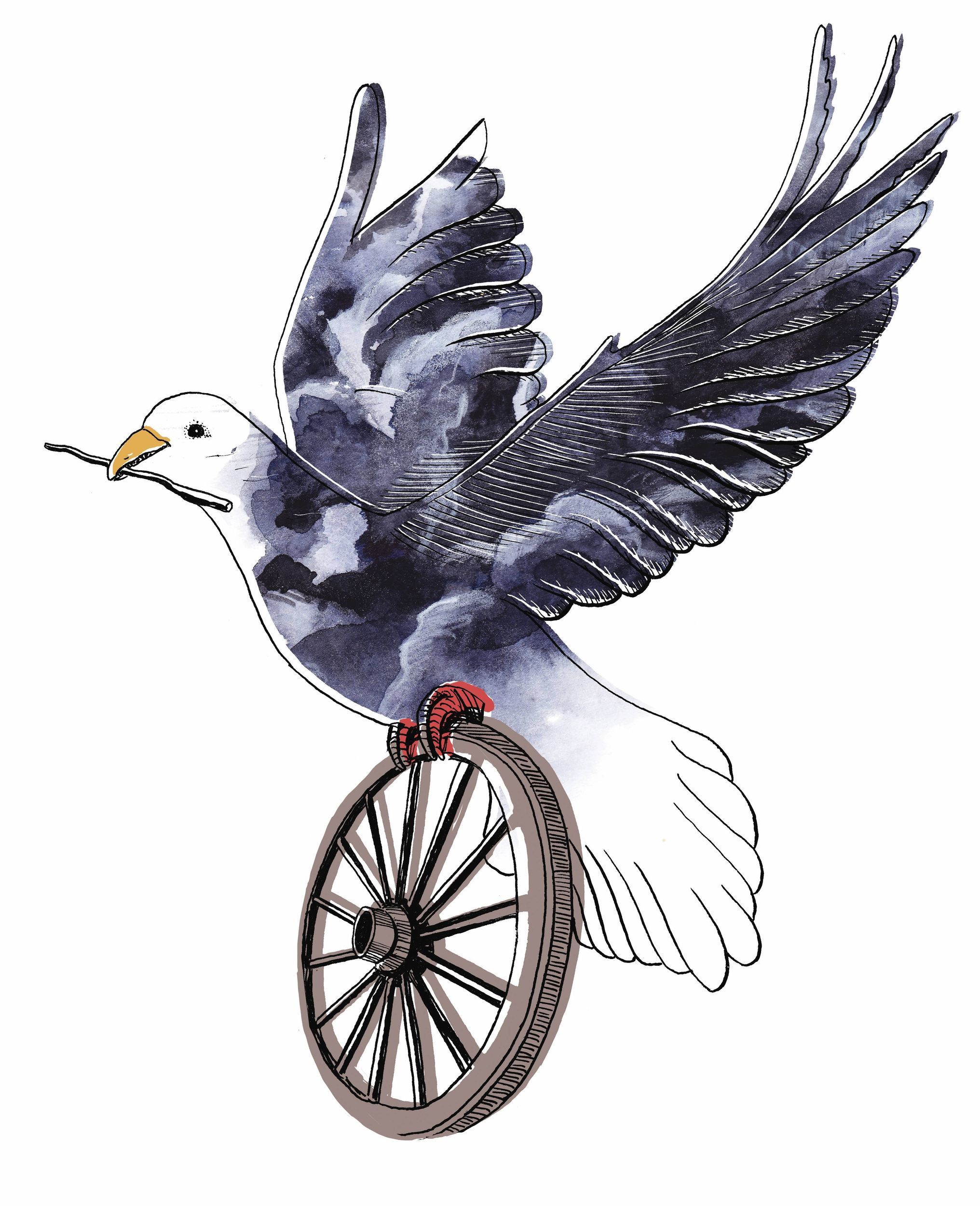
Your father did put on the uniform of the Wehrmacht but refused to use the weapon. What was his motive?
“He was given the space to become a nurse. Whether he ever carried a weapon, I don’t know. But he refused to shoot. That was his conviction as a Christian. He was on Bonhoeffer’s line with that. Without knowing it, because Bonhoeffer was still quite unknown at that time.”
You say that Christian soldiers from different countries should not fight each other. Why not?
“That is contrary to the Christian brotherhood. Christians have a closer relationship than non-believers. They are allowed to defend national interests but not to wage war.
In our time, we realise that Christianity is international. But in Bonhoeffer’s nationalist Europe, this was an unknown sound.”
Nevertheless, Prof. Mayer does not think it would be good if the German government disbanded the army tomorrow. “War should not exist, indeed. But sometimes, defence is necessary. Bonhoeffer did not preach defencelessness. Fortunately, the Netherlands has also been liberated. Unfortunately, it could not be done without violence.”
And what should the church then say to her sons?
“The church should say what God’s will is, says Bonhoeffer. It must be guided by God’s Spirit and make a binding statement. Not that the church cannot make a mistake. But God will then forgive our ‘alleged good deeds’.”
In such a justified war of defence, of course, Christians can also come up against other Christians.
“Bonhoeffer never thought from the individual but from the congregation. Luther, too, says that Christians should not participate in an unjust battle. In a war of defence, of course, that is easier.”
Bonhoeffer also says that the church should sometimes “put a stick between the spokes” of the state. That sounds pretty violent.
Mayer laughs: “That is probably how it would sound to a Dutchman. Just imagine getting a stick in the spokes of your bicycle. Then you fall down.
In Bonhoeffer’s time, farm wagons and cars also had spokes. If you put a stick in between them, the vehicle will come to a standstill, but it will not fall over.
Bonhoeffer says this about the Jewish question. He believes that the church must call the state back to its proper task: to provide law, order and protection. He thought from the doctrine of mandates, in which labour, family, church and government have an independent task.
He saw the insertion of a stick in the wheels as a one-off border crossing from the church to the state. It is not a justification for tyrannicide.”
Yet, he was involved in the assault on Hitler in 1944.
“On behalf of the conspirators, he asked Allied contacts what would happen if Hitler were killed. The guarantee of an armistice was never given. Bonhoeffer supported the attack but also knew himself guilty of it.”
Mayer picks Bonhoeffer’s “Ethik” off the shelf and browses. “In this passage, I think the key lies: “Whoever accepts guilt in responsibility (and no responsible person can avoid it), surrenders himself to God’s grace. Towards other people, he is free in his conscience.” So the more accountability, the more guilt. To an unbeliever, this all sounds strange, of course.”
Peace & war in the creeds
The Southern Baptists in the United States have included a separate article on peace and war in their Statement of Faith (Baptist Faith and Message, 2000). In it, the line of Augustine is recognisable. War is not rejected, but Christians should especially seek peace.
In older Protestant creeds, war is hardly mentioned. The Westminster Confession (1647) does briefly mention the “lawful war” that is “just and necessary” in civil government (article 23.1). This reference is missing in article 36 of the Belgic Confession of Faith (1561). Also, Lord’s Day 10 of the Heidelberg Catechism (1563) mentions “health and disease” and “wealth and poverty” but not “peace and war”.
An old wisdom teaches: He who wishes peace prepares for war. Could Bonhoeffer have said that?
“That is very worldly thinking. The Roman Empire, in which that saying was born, was built on violence. It fought chaos, which was good in itself. But this empire brought no more than a churchyard peace.”
A Dutch Calvinist would probably say to Bonhoeffer in Fanø: You even make our hero, Prince William of Orange, an evildoer.
“Haha, that question would have been unimaginable for Bonhoeffer. Perhaps he would have answered from his doctrine of mandates that the Spanish government restricted freedom of conscience too far. Therefore, a stick between the spokes was necessary.”
The Dutch are used to approach such questions from the perspective of national history. Bonhoeffer lacks that kind of historical reflection.
“That is true. He was bound to God in faith and thus focused on the future. Even before 1940, he was thinking about the reconstruction of Germany after the war. He was concerned about the survival of Christian civilisation.
Germany also has a very different history from the Netherlands. We are an amalgamation of separate principalities in which religion has had very diverse effects. Our history fills us with terror rather than with joy.”
Augustine about war
In his books, letters and sermons, the Church Father Augustine (354-430) regularly addressed the issue of war and peace. Apparently, this was a topical theme in his time.
Augustine sometimes sees waging war as a necessity. But this necessity must remain bitter and not result in violent pleasure.
From Augustine’s work (especially from “The City of God”), the image arises that he only justifies defensive wars. He notes that the Roman Empire would never have been so large without miserable wars with neighbouring peoples. However, the Romans would have been better off investing in good neighbourly relations.
The quote above is from a letter from the year 415 (Epistulae, 189, 6).
What would Bonhoeffer say about the war of Russia against Ukraine?
“From what I know of Bonhoeffer, he would call for a Christian council between the Western Church and the Eastern Church. Patriarch Kirill is known to be on Putin’s side. The Western churches stand by Ukraine. But, and this is Bonhoeffer’s basic conviction: Christian brotherhood is above all national differences. Eastern and Western churches should proclaim a message of peace together. Why is this not happening today? Why is such a common Christian message of peace not heard?”
Most of this article was published in Dutch in Reformatorisch Dagblad on May 9th, 2016. The last question and answer were put in.
Related Articles



